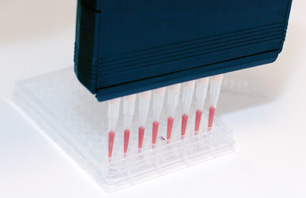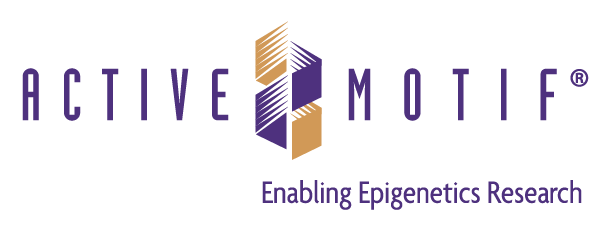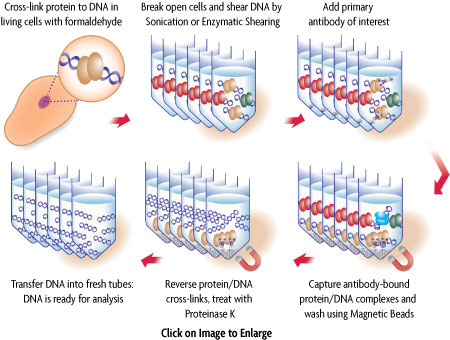ChIP-IT® Express High Throughput
ChIP-IT-Express-High-Throughput-AM507
Synonyms
| Name | Format | Cat No. | Price | Delivery |
|---|
Overview
ChIP-IT® Express HT enables you to perform chromatin immunoprecipitation (chromatin IP) in a fast, reproducible high-throughput format. It combines the speed and efficiency developed in the creation of our groundbreaking magnetic bead-based ChIP-IT® Express Kits with a 96-well plate format, enabling the rapid and efficient processing of a large number of ChIP reactions. The kit works with chromatin prepared using either sonication or enzymatic shearing, and is compatible with ChIP-chip and ChIP-seq methodologies.
To help you achieve the best results possible, Active Motif offers a number of ChIP Accessory Products that were designed to make it even easier for you to perform successful ChIP when working with ChIP-IT Express HT:
Documents (7)
Description
ChIP-IT Express HT offers high throughput chromatin IP
ChIP-IT Express HT combines the efficiency and time-savings of the magnetic bead-based protocol of ChIP-IT Express with the ability to process up to 96 ChIP reactions simultaneously. The ChIP-IT Express HT Kit contains components to perform 96 ChIP reactions. The included LSV (Low Sample Volume) Protein G-coated magnetic beads are provided ready to use. These beads have a high binding capacity for IgG, enabling them to be used in smaller volumes that reduce non-specific binding. Because of this lower non-specific binding, magnetic beads require fewer washing steps than agarose beads, and it is not necessary to pre-clear the chromatin.
An added advantage is that the magnetic beads pellet much more quickly than agarose beads, which are pelleted by centrifugation. Commercially available 96-well magnetic stands such as the Ambion Magnetic Stand-96 or the Novagen Magnetight HT96 Stand are designed to pellet the beads onto the side of the tube. This makes it easy to remove buffers without disturbing the beads, so washing can be performed using multi-channel pipettors. This dramatically reduces hands-on time and ensures sample-to-sample consistency. The LSV Protein-G coated magnetic beads are also optimized for use in the small sample size of a microplate well.

Figure 1: High-throughput ChIP with ChIP-IT Express HT.
Now you can perform 96 ChIP reactions simultaneously with ChIP-IT Express HT and a multi-channel pipettor. The magnetic bead-based protocol enables faster washing steps.
Choose from sonication or reproducible enzymatic shearing
The first step in successful ChIP is shearing the chromatin into 200-1000 bp fragments. This is most commonly achieved by performing sonication with equipment like Active Motif's EpiShear™ Sonicators. However, sonication can be difficult to optimize due to complications that can be caused by emulsification and overheating. Because of this, or if you don't have a sonicator, Active Motif has developed a robust, user-friendly method to shear chromatin by enzymatic digestion. Because Active Motif offers both ChIP-IT Express and ChIP-IT Express Enzymatic Kits, you can choose whichever shearing method you prefer. For more complete information on these shearing methods, please click here to learn more about your options.
Overview
Magnetic beads reduce background and speed ChIP
ChIP-IT Express HT is based on the improvements made during the development of ChIP-IT Express, the first magnetic bead-based ChIP kit. In ChIP-IT Express and ChIP-IT Express HT, cells are treated with formaldehyde to fix protein/DNA interactions and then the fixed chromatin is sheared by either sonication or enzymatic digestion. The sheared chromatin is incubated with an antibody directed against a protein of interest, and antibody-bound protein/DNA complexes are precipitated through use of magnetic Protein G-coated beads. The captured chromatin is then eluted and cross-links are reversed so that the released DNA is ready for PCR analysis to localize the protein to a specific DNA region or regions (Figure 1).
Figure 1: Schematic of chromatin immunoprecipitation using ChIP-IT Express HT.
Why use ChIP-IT Express HT?
- Complete solution – all critical reagents needed are supplied
- Compatible with genome-wide profiling or selective PCR-based approaches
- No need to optimize reagents and protocol
- No phenol/chloroform extractions – DNA purification step eliminated in ChIP-IT Express and ChIP-IT Express HT

Figure 2: Chromatin immunoprecipitation using ChIP-IT Express HT.
PCR analysis of immunoprecipitated DNA is shown. HeLa cells were fixed for 10 minutes with 1% formaldehyde and then chromatin was prepared by sonication shearing (5 pulses). ChIP was performed in duplicate on chromatin using a Negative Control IgG and an RNA pol II antibody. The DNA isolated from these ChIP reactions was then analyzed by 36 cycles of PCR using GAPDH positive control primers. These antibodies and primers are available as the ChIP-IT Control Kit – Human. Kits for mouse and rat are also available (see Available Products, above right). Ten µl of each PCR was separated on a 1% agarose gel and visualized by UV-illumination following ethidium bromide staining. PCR using the GAPDH primers on DNA isolated with the RNA pol II antibody (Lanes 1-4) reproducibly generated more product than similar reactions performed on DNA isolated using the Negative Control IgG (Lanes 5-8). These results demonstrate that ChIP performed with RNA pol II antibody (compared to negative IgG) greatly enriched for GAPDH promoter DNA. Lane 9, No DNA control. Lane 10, Input DNA control.
Contents
ChIP-IT Express HT provides sufficient components to perform 96 ChIP reactions. The kit is compatible with chromatin prepared using either the ChIP-IT Express Shearing Kit or the ChIP-IT Express Enzymatic Shearing Kit. We recommend that you also purchase whichever ChIP-IT Control Kit is appropriate for your sample type, as using proven controls helps in troubleshooting, interpreting your results and validating antibodies for use in ChIP.
Contents & Storage
LSV Protein G Magnetic Beads, ChIP Buffers 1 and 2, Elution Buffer, Reverse Cross-linking Buffer, Protease Inhibitor Cocktail, Proteinase K, Proteinase K Stop Solution, 5 M NaCl, 96-well microplate and microplate capstrips. Reagent storage conditions vary from room temperature to -20°C. Please download a manual for complete kit specifications and storage conditions. All reagents are guaranteed stable for 6 months when stored properly.

